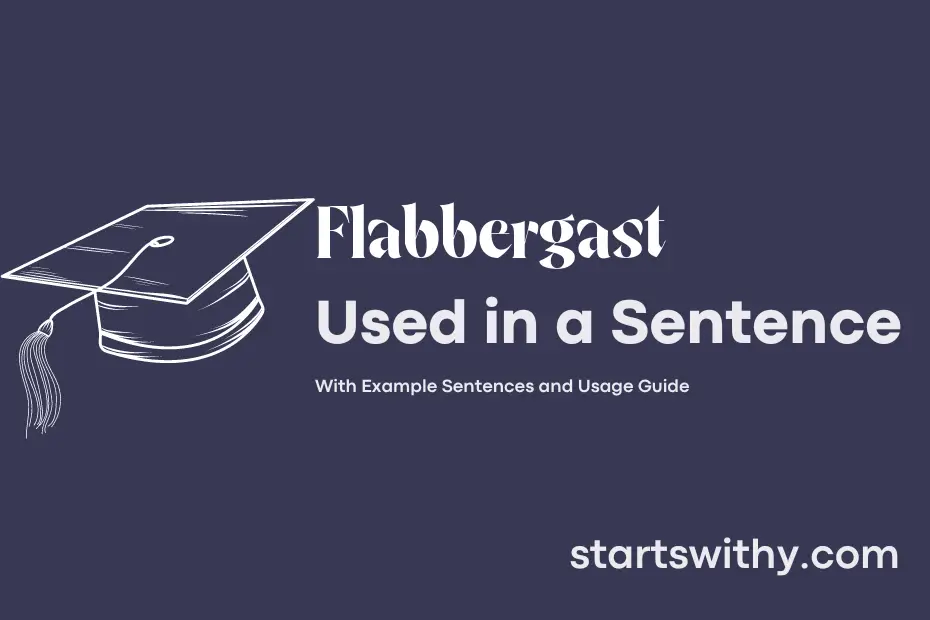Have you ever been so surprised or amazed that you were left speechless? That feeling of astonishment that leaves you completely stunned is what we call “flabbergast.”
Flabbergast is a verb that describes the act of shocking or amazing someone to the point where they are rendered speechless or deeply astonished. It is a powerful word that conveys a sense of extreme surprise or disbelief.
7 Examples Of Flabbergast Used In a Sentence For Kids
- The magician’s trick made the audience flabbergast.
- The news of a snowstorm in Mumbai flabbergasted everyone.
- The giant dinosaur skeleton at the museum flabbergasted the children.
- The acrobat’s somersaults and flips were flabbergasting.
- The sudden appearance of a rainbow after the rain flabbergasted the kids.
- The talking parrot at the zoo flabbergasted the visitors.
- The surprise birthday party flabbergasted the little girl.
14 Sentences with Flabbergast Examples
- Flabbergast your classmates with your impressive presentation skills.
- You will flabbergast your professors with your outstanding research paper.
- Flabbergast your friends with your exceptional dance moves at the college festival.
- His brilliant idea to use virtual reality technology flabbergasted the judges at the competition.
- The unexpected plot twist in the film flabbergasted the audience during the college movie night.
- Your ability to recite a complex poem from memory will surely flabbergast your literature professor.
- The news of your internship offer at a prestigious company will flabbergast your peers.
- Flabbergast your fellow students by acing the difficult exam without studying much.
- The breathtaking performance by the guest speaker flabbergasted the entire auditorium.
- Your innovative solution to the group project will flabbergast your team members.
- The sudden drop in temperature during the outdoor event flabbergasted everyone.
- The arrival of a famous guest lecturer will surely flabbergast the college community.
- The extravagant decorations for the college fest will flabbergast everyone attending.
- The announcement of a surprise test flabbergasted the students in the class.
How To Use Flabbergast in Sentences?
Flabbergast is typically used to describe a feeling of extreme surprise or astonishment. When incorporating this word into a sentence, it is important to consider the context and tone of the situation. For beginners, here are some tips on how to use flabbergast effectively:
-
Identify the emotion: Before using flabbergast, make sure the situation truly evokes a sense of shock or disbelief. This word is best used when something truly astonishing or unexpected happens.
-
Use it sparingly: Since flabbergast is a strong and vivid word, it is best suited for situations that truly warrant such a powerful reaction. Avoid overusing it to maintain its impact.
-
Consider the audience: Make sure the people you are communicating with understand the meaning of flabbergast. It is a more formal word and may not be appropriate in casual conversations.
-
Provide context: When using flabbergast in a sentence, try to provide enough context so that the reader or listener understands why the reaction is so extreme.
-
Examples: “I was completely flabbergasted by the news of her resignation.” “The magician’s tricks left the audience flabbergasted.”
By keeping these tips in mind, beginners can effectively use flabbergast in sentences to convey a strong sense of surprise or amazement.
Conclusion
In conclusion, the various sentences provided earlier exemplify how the word “flabbergast” is used to express surprise, shock, or astonishment. Whether it is through encountering unexpected news, witnessing remarkable feats, or experiencing overwhelming emotions, “flabbergast” captures a sense of intense disbelief or amazement. These sentences showcase the versatility of the word in conveying a wide range of reactions to startling events or revelations.
By using “flabbergast” in sentences, writers are able to vividly illustrate the impact of the unexpected on characters or situations. This word adds depth and color to descriptions, helping readers to better empathize with the emotions being conveyed. Through the examples provided, the power of “flabbergast” in evoking strong emotional responses can be clearly seen in a variety of contexts.



